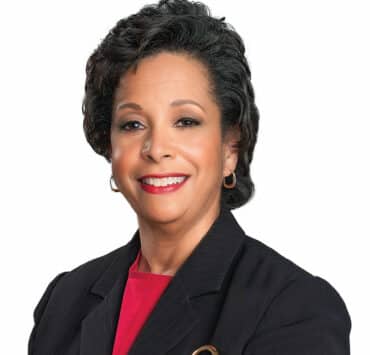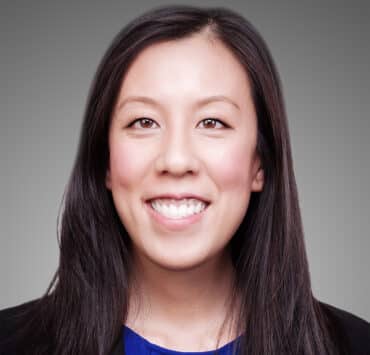|
Getting your Trinity Audio player ready...
|
Catherine Tornabene has never been one to sit down and chart out a five- or ten-year career plan, but she doesn’t lack ambition or discipline. In fact, she’s attended some of the country’s top universities and worked for a few of the world’s most valuable brands. But, instead of just climbing the corporate ladder, she follows what grabs her interest and looks for places where she can be open, authentic, and curious. The approach has led her to develop a unique expertise in engineering and law that she’s now using as an intellectual property (IP) lawyer at a leading autonomous vehicle company known as Aurora.
Tornabene grew up in the Bay Area of California and enrolled at the University of California, Santa Cruz (UCSC) to study English literature and history. She was settling into her first year when something in the catalog caught her eye. UCSC offered a course called “Beginning Programming for Social Sciences Majors” where social sciences and humanities students would learn basic programming skills and problem-solving techniques to aid their research.
The class seemed interesting. Tornabene signed up and enjoyed the lessons. And as she learned to write code and harness the power of data, a new world opened to her. She switched to a double major in history and computer science, which later led her to pursue a master’s in computer science at Stanford University.
Upon graduation, Tornabene started her career as a software engineer at a small but growing company. The work changed in 1999 when that company was acquired by computer services giant Netscape. Netscape was acquired by AOL, AOL merged with Time Warner, and suddenly, Tornabene was a senior software engineer at the world’s largest media company.
“I already had a natural interest in the law, and watching all of these mergers and acquisitions made me want to learn more.”
Catherine Tornabene
Although she enjoyed her work, observing and experiencing the sequence of events leading to the merger sparked something in Tornabene’s mind. “I already had a natural interest in the law, and watching all of these mergers and acquisitions made me want to learn more,” she explains. Tornabene’s curiosity took her to the University of California’s Hastings College of Law, and she started her second career as an associate at Skadden.
It didn’t take long for Tornabene and her mentors to see how her experience in programming and engineering could be an asset. She moved into the firm’s IP and technology group and later left for an in-house role at Google, where she spent more than eight years as an intellectual property counsel.
In 2017, Tornabene left Google to join Aurora just six months after Chris Urmson (former chief technology officer at Google’s Self-Driving Car Project) started the company along with cofounders Sterling Anderson (of Tesla Autopilot) and Drew Bagnell (from Uber and Carnegie Mellon University). Leaving one of the most iconic multinational tech companies in history for an up-and-coming start-up may sound risky, but Tornabene was convinced it was the right move for her. “This was a once in a lifetime chance to think through uncharted legal issues associated with a new industry,” she explains. “I’ve followed my curiosity throughout my entire career, and it’s never let me down before.”
“I’ve followed my curiosity throughout my entire career, and it’s never let me down before.”
Catherine Tornabene
An expert leadership team guiding a “mission-driven company with a deep bench” also helped ease the transition. Aurora is built to provide services related to both autonomous trucking and passenger mobility. The company will make roads safer and help make transportation a more accessible experience. That mission resonated with Tornabene. Her father, an ER physician, treated patients involved in traffic collisions. Her grandmother had to rely on others for transportation after she stopped driving in her eighties.
When Tornabene started at Aurora, she was helping a small legal team form partnership agreements and handle foundational corporate matters. As her team and the company grew, she moved into more of a traditional role to build Aurora’s IP portfolio and protect the “significant innovation” behind the Aurora Driver platform.
The Aurora Driver combines sensors that gather information, software that maps the best route, and a computer that integrates these elements with any vehicle type from sedan to semi-truck. Partners and customers will use the technology for autonomous long-haul trucking, goods delivery, and people movement. Tornabene and her team have worked to protect all components, including those in Aurora’s FirstLight Lidar, an advanced long-range imaging system that generates an accurate 360-degree view in real time to let vehicles react to changes in the environment, avoid obstacles, stop for pedestrians, and complete a safe journey.
The system can work on various vehicle platforms, and Aurora is now outfitting vehicles for Toyota and moving freight for Uber and FedEx. Before long, fleets of driverless cars, taxis, and semis will be crisscrossing the roads and highways of America. It’s an exciting time at Aurora, and although Tornabene doesn’t know exactly what’s in store, she’s looking forward to the journey ahead. “I may not have the exact map,” she says. “But my passion for lifelong learning has taken me far, and I intend to go wherever the road may lead.”
Dority & Manning, P.A.:
“Catherine is an ideal partner in the legal field. She stands out in the IP industry due to her deep-rooted technical expertise, integrative work style, and ability to build talented teams.”
–Erik Sivertson, Principal


